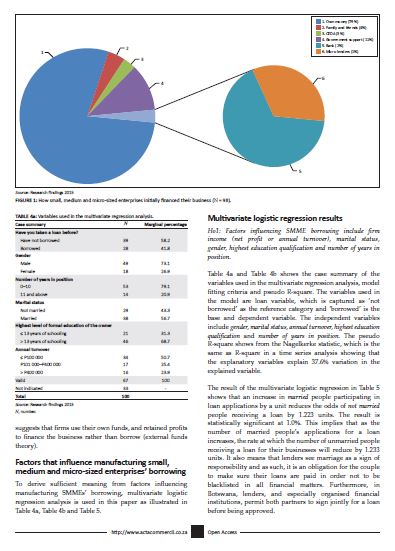Factors influencing small, medium and micro-sized enterprises’ borrowing from banks
The case of the Botswana manufacturing sector

The objective of the study: The main objective of this study is to determine the factors that influence manufacturing small, medium and micro-sized enterprises’ (SMMEs) borrowing from banks.
Problem statement: This article examines factors that affect SMMEs’ ability to borrow money from commercial banks. Empirical evidence was collected from manufacturing SMMEs.
Motivation for the study: There is a scarcity of studies on factors influencing borrowing among Botswana manufacturing SMMEs.
Methodology: The study employed both qualitative and quantitative research designs. The random stratified sampling technique was used to draw a sample of 100 manufacturing SMMEs from a population of 329 registered manufacturing SMMEs in Botswana. Descriptive and inferential statistics were used to analyse the data. Furthermore, multivariate logistic regression estimation was used to obtain the main objective.
Main findings: The empirical results showed that longevity in position and annual turnover have positive impact on getting access to bank loans, while marital status has a negative effect on access to bank loans.
Practical implications: An understanding of factors influencing borrowing can increase chances of an SMME gaining financing from commercial banks, thus solving the challenge of access to finance.
Contributions: The results are significant to SMMEs, policymakers, the banking sector and other researchers. Furthermore, this study increases literature on SMME challenges and financing logistics.


Comments